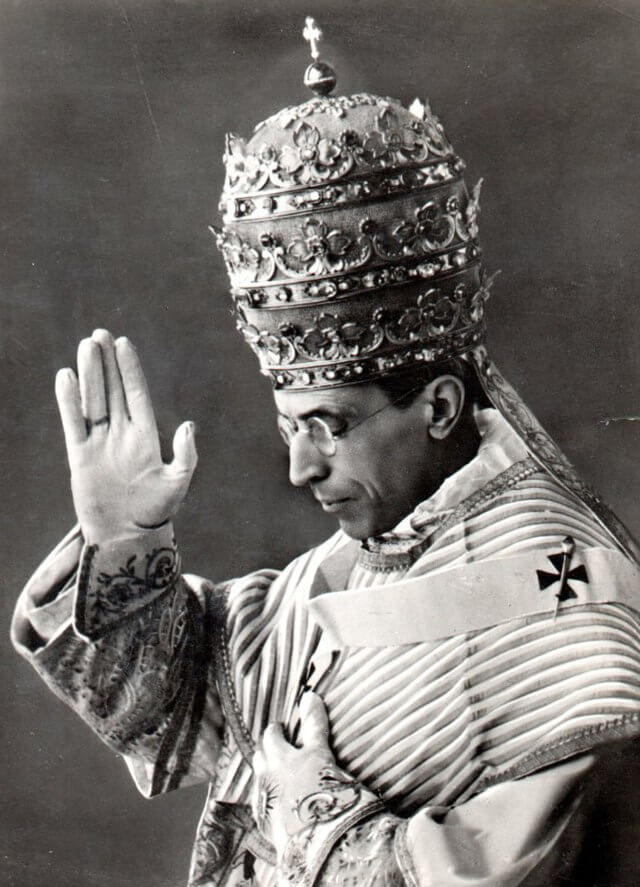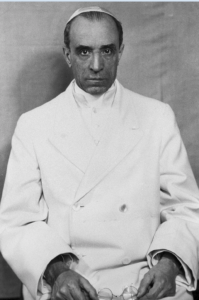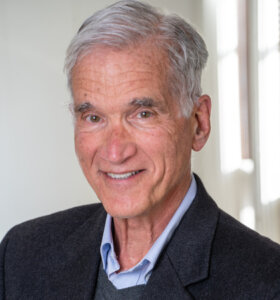A new book explains Pope Pius XII’s silence during the Shoah — but does not excuse it
Using newly-opened Vatican archives, David Kertzer discovered the pope’s secret meetings with Nazis and refusal to confirm the mass murder of Jews to the Allies

Eugenio Pacelli’s coronation as Pope Pius XII on March 12, 1939. Courtesy of Wikimedia Commons
One day in late October 1941, Pope Pius XII received chilling news. A bishop in Slovakia wrote to say that the country’s Jews “are simply being shot … systematically murdered, without distinction of sex or age.”
We can get a sense of how Pius reacted to this report, the first credible account of Nazi mass murder to reach him; that same day, the pope blessed 80 Nazi soldiers and sat for a sculptor. A reference photo of the pontiff modeling for his bust, holding his spectacles and staring straight at the camera, betrays a beleaguered intensity.

You can find the picture in David Kertzer’s new book, “The Pope at War: The Secret History of Pius XII, Mussolini and Hitler” — and while it may be worth a thousand words, the pope’s evident distress was not enough to break his policy of silence.
“We have accounts of where priests are coming and telling him about the Jewish babies being murdered and tears come to his eyes,” said Kertzer, also the Pulitzer Prize-winning author of “The Pope and Mussolini,” about Pius XII’s predecessor Pius XI. “At some human level, obviously, he’s affected by this, but also he’s obviously defensive about the fact that he isn’t denouncing it.”
While it’s known that Pius never spoke out against the Nazi persecution of Jews before, during or after World War II, historians like Kertzer have only recently had access to Pius XII’s Vatican archive, unsealed in 2020. (A delay in opening papal archives is typical, though researchers had taken a particular interest in the wartime pope.) Drawing from its documents, Kertzer’s book details for the first time evidence of secret meetings between the pope and an emissary of Hitler as well as the cleric’s refusal to confirm reports of Nazi mass murders to Franklin Roosevelt.
Pius XII, who served as nuncio to Germany and cardinal secretary of state before his ascension, emerges as a circumspect diplomat, eager to appease the Nazis and Mussolini in the hopes of protecting the church and advancing its interests — and ever aware that many avowed Nazis were among his faithful. Pius’ public pronouncements were carefully calibrated to be ambiguous in their praise and criticisms of wartime hostilities. His actions to stop the oppression of Jews were concerned above all with the baptized and those in interfaith marriages. In the end, he wanted a role in brokering a peace, largely to curb the spread of communist influence in Europe, which he deemed a larger threat than Nazism.
Kertzer’s book is a captivating account of palace intrigue with a colorful cast of cardinals, diplomats, princes and fascist leaders. Kertzer’s revelations can be infuriating, but they help make sense of a papal tenure often excused away by apologists and, until now, not fully understood by scholars. In the final reckoning, the author shows that Pius XII was neither “Hitler’s Pope” nor a moral leader to be admired.
I spoke with Kertzer about the pope’s infamous silence and how he thinks the Vatican will respond to his latest book. The following interview has been edited for length and clarity.
PJ Grisar: A large part of this was informed by what you learned within the Vatican archives — first opened in March 2020, and closed down soon after by the pandemic. What were you eager to see when first you got there?
David Kertzer: I discovered these documents from the middle of December 1943, which showed the actual attitude toward Jews in the Vatican at the time that they were being taken off to Auschwitz. I did find those kind of shocking — particularly the timing. October 16, 1943, was the roundup of the Jews of Rome, where over 1,000 were sent to Auschwitz, essentially to their death, and the pope kept silent. But then six weeks later, November 30, Italy, under the control of the Germans and their puppet Italian Government, sent an order to all the police throughout the country ordering the arrest of all the Jews and sending them to concentration camps, from which they’d be taken to the death camps. This came two weeks after that order — the pope’s main adviser on Jewish affairs said he shouldn’t do anything to protest and gave a raft of antisemitic rationales.
I imagine that the fall of 1943 stuck out in your mind, knowing that these Jews were being kept so close to the Vatican as they awaited deportation.
The Jews of Rome were rounded up and held — literally inside of Vatican City, just outside the walls — for two days. It was quite a long time and the pope knew what their fate would be. The fact that he did not protest — he wasn’t happy, obviously — among other things, it made him look terrible, and put him in a very awkward position — that was pretty dramatic.
Again and again, we see the pope choosing his words carefully. Some continue to defend him for any number of reasons. What do you have to say to them now?
It’s a complex, multivariate kind of issue, there are certainly different perspectives to have, but the notion that the pope didn’t issue a protest because he was afraid that it would harm the Jews, this is kind of laughable — that he could get Hitler even angrier at the Jews. Like Hitler didn’t already want to eliminate all of the Jews in Europe. There are things that you can say to defend the pope: namely, he saw his main responsibility as protecting the church. That’s what he did. And he did a pretty good job of it. But to call him a courageous moral leader, it’s hard to stomach people saying that.
You have an excerpt in The Atlantic about the pope’s secret meetings with a Hitler go-between, Philipp von Hessen. How does that change our understanding of the extent of his collaboration?
That really was the most clamorous findings in the newly opened archives — that the pope was engaged in secret negotiations with Hitler through the Nazi prince who was son-in-law of the Italian king. The Vatican had been able to keep that secret for the past 80 years, till my book. That Hitler kept this a secret from his own ambassador to the Holy See and the pope kept it a secret from many of his closest advisors and the secretary of state, it’s kind of amazing. It certainly makes us understand much better the pope’s attitudes, at least in the beginning of the war, in the first couple of years — ’39 to ’41 — while these were taking place. The pope is basically saying, “Look, if you just let up pressure on the church the Catholics will be your most loyal servants in the Third Reich.” And saying nothing about why they shouldn’t be the most loyal servants of the Nazi regime. It gives a whole new dimension to our understanding.
I was surprised to learn just how much he knew about the Shoah and how many people were appealing to him.
It was already pretty clear that he would have, given an incredible network of bishops and priests throughout occupied Europe, a pretty good idea what was going on. What’s most dramatic there, I think, was when President Roosevelt asked him — I think this is the fall of ’42 — whether he could help verify the accounts of the the mass murder of Europe’s Jews by the Nazis, and they had all this confirmatory evidence. What I did discover in the newly opened archives is, again, his expert on the Jews — who later becomes Cardinal Vicar of Rome — gives him the advice that you shouldn’t verify it or provide any confirmation to Roosevelt because they’ll undoubtedly use it for their own propaganda — namely, to discredit the Nazis by showing that they’re involved in the mass murder of Jews. It’s kind of incredible, too.
He did intercede on behalf of “baptized Jews” — that seemed to be his main concern.
Even before we get the Holocaust, we have the racial laws in Italy. The racial laws come into play in 1938. The pope and the church never complained about them, except that they’re applied to baptized Jews. When Mussolini falls, the pope sends his representative to the new minister of internal affairs in charge of police. He says “don’t get rid of racial laws, they’re generally a good thing — but we’ve been arguing for five years that baptized Jews should be excluded from them and now’s the time to do something about it.” That doesn’t mean that the pope wanted to see Jews massacred; he certainly didn’t.
This also becomes clear with the newly opened archives: On October 16, about 1,260 Jews were rounded up. But, two days later, just a little over 1,000 are on the train. What happened to the other 250? Well, there’d been a furious process in the previous 48 hours going on to verify the baptismal status of Jews and to identify Jewish men who married Christian women with the understanding that their children would be raised as Catholics. This is something else I think that’s pretty new in my book. The received wisdom is that for the Nazis, it didn’t matter whether you were baptized or not — that it was racial and you were a Jew by race. That may be true elsewhere, but certainly not in Italy, where the Nazis wanted to keep on the good side of the pope. Doing that did release all these baptized Jews, plus it basically meant throughout this period that the church is involved in the Nazi selection of who would live and who would die depending on whether they could come up with baptismal certificates for people.

Was there anything that you found admirable in his response?
There was a lot of humanitarian, Red Cross sort of work done through the Vatican during the war — but it was designed not to risk any negative blowback. Throughout the war, the Vatican maintained good relations with the Nazi government. And this is especially important to the pope during the nine months of German military occupation of Rome in ’43, ’44. Which coincided with the roundup of the Jews in Rome, too. This is another reason why he didn’t speak out.
You’ve written about Pius’ predecessor, and the book begins with a dramatic moment for him. He was poised to condemn racism, Nazism, and antisemitism but died just before. How might that have changed things had he been able to hang on longer?
There are kind of two parts here in terms of what impact a papal denunciation could have had: one is in Italy, and one is in Germany, just to simplify. The fact is, in terms of Italy, the war’s gonna begin — it’s generally dated to the invasion of Poland, September 1, 1939. Italy doesn’t immediately join the war. It’s not at all clear it will join the war. And the Italians had no love for the Germans. They fought in a war against them not long ago. The whole notion of Aryan supremacy wasn’t gonna go down that well with most Italians. And the idea of dying for Hitler made no sense. So Mussolini faced a big challenge of how to get the Italians behind him, and if the pope had denounced and said “No good Catholic could participate in this evil war” — that would have been a huge blow for Mussolini’s ability to join the war. So there, I think, the pope could have had a huge impact.
What impact would it have had on Hitler and the war? Particularly after Austria and the Sudetenland are gobbled up, about half the Third Reich’s population was Catholic. If he had excommunicated Hitler and the other Catholics in leadership there and said, “What they’re trying to do is evil” and so forth, it would have had an impact. Whether it would have stopped things, that may be too much to expect.
And that that applies to either Pius XI or Pius XII speaking out.
Pius XI was not poised to excommunicate Mussolini, and his text was probably not as thoroughgoing a denunciation as we would like. But he at least, in the months before his death, was ensuring that the Vatican newspaper regularly published denunciations of the Nazi government for persecution of the church. And the day that [Pius XII, Eugenio] Pacelli becomes pope he puts an end to that. There’s a pretty strong dividing line there.
What do you anticipate the Vatican response to this book will be?
I’m not encouraged by the fact that the first thing I published out of these newly open archives, was that piece in The Atlantic in August 2020, and one week after that appeared, the Vatican newspaper, L’Osservatore Romano, published a full-page denunciation of the piece and of me. The Roman Catholic Church in Germany and France, elsewhere, have begun to come to terms with their problematic history during World War II, and in some cases issue apologies, but the Vatican has never done that. One might have hoped that with the opening the archives and with Pope Francis’ papacy calling for more opening up to the real world and getting out of their silo that there might be willingness to more seriously address this history. If that response to the first piece I published is any indication, I’m not expecting a lot of praise coming out of the Vatican for this book. I hope I’m wrong, obviously — maybe I’m wrong. We’ll see. The Italian edition came out last week, so perhaps we’ll see something in the Catholic press in Italy pretty soon.
You end the book speaking about the immediate revisionism in Italy after the war. Has that culture shifted?
What’s remarkable to me — I just spent the last three months in Italy — is how little that has changed. It’s not just the Vatican, it’s part of a larger refusal to confront the history of World War II by Italy — rewriting the history so Italians actually fought for the Allies, they weren’t one of the main Axis powers fighting for Hitler’s victory. Still today in Italy you get this sensation that this is how people regard their past. The book talks about the fact that the entire organized church in Italy was, from the day that Mussolini announces he’s joining Hitler in the war, calling on all good Catholics as part of their religious responsibility to do their part in the Axis war. The church has never confronted any responsibility for the action they took in this. It’s part of a much bigger set of issues, moral and political and historical.
The book mainly covers the war years, but during Pius’ tenure there were the ratlines — escape routes for the Nazis facilitated by some members of the Catholic clergy. I don’t know how involved he was with all of that or if he knew what was going on.
Gerald Steinacher has written a good book, “Nazis on the Run,” which gets at Vatican involvement. I don’t think the pope was directly involved in it, but what the pope was involved in — this is something I’m now looking at — is having the Vatican testify on behalf of a number of Nazis who were on trial in Nuremberg for war crimes. Anyway, that’s another story.
A message from our Publisher & CEO Rachel Fishman Feddersen

I hope you appreciated this article. Before you go, I’d like to ask you to please support the Forward’s award-winning, nonprofit journalism so that we can be prepared for whatever news 2025 brings.
At a time when other newsrooms are closing or cutting back, the Forward has removed its paywall and invested additional resources to report on the ground from Israel and around the U.S. on the impact of the war, rising antisemitism and polarized discourse.
Readers like you make it all possible. Support our work by becoming a Forward Member and connect with our journalism and your community.
— Rachel Fishman Feddersen, Publisher and CEO






























